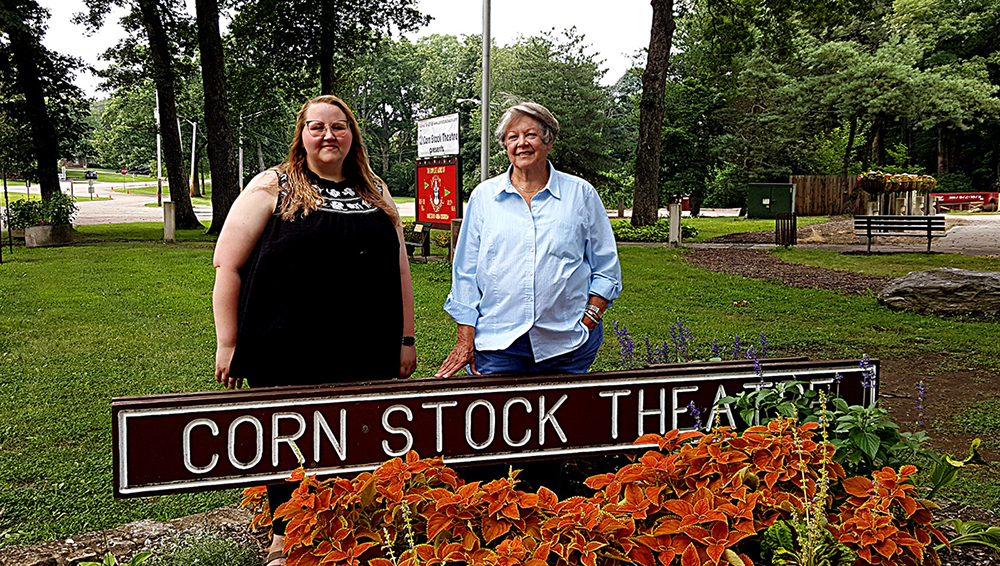
At Corn Stock Theatre, grants & fundraising coordinator Maggie Sloter, left, and longtime CST member and volunteer Rebekah Bourland commented on the Shuttered Venue Grant Program. Slater was instrumental in securing government aid to the non-profit enterprise. (PHOTO BY BILL KNIGHT)
The arts are vital to America, and many culture groups were hit hard during the pandemic, according to Brookings Institution which reported the sector lost $150 billion in revenue and 2.7 million jobs. Fortunately, Washington saw that helping such organizations was needed to revive the country, recognizing that the arts matter not only as a key part of the economy, but to help people appreciate and better understand the world.
In central Illinois, arts groups generate more than $35 million, with 1.1 million people attending area events annually, as the Community Word reported in 2019.
The government aid has helped many, despite difficulties.
Now called the Shuttered Venue Operators Grant (SVOG), administered by the Small Business Administration (SBA), such aid was initially proposed as “Save Our Stages,” by Sens. John Cronyn (R-Texas) and Amy Klobuchar (D-Minn.), providing a lifeline for theaters, museums, dance companies, humanities centers, etc.
Open to businesses that suffered substantial financial losses, it passed and provides about $16 billion in funding to such cultural institutions
Stephen Chilton, a board member with the National Independent Venue Association (NIVA), said, “A lot of venues made the decision to hold on instead of close when the aid package was approved.”
Civic Center General Manager Rik Edgar says they received a SVOG grant in August.
“We submitted paperwork as soon as we were eligible,” he says. “It took several months, but we understood it would be a lengthy process with so many venues needing assistance.”
Maggie Sloter, the grants & fundraising coordinator at Corn Stock Theatre, said it took a week to complete forms, furnish photos, seating charts, lighting details and financial records, but they received assistance.
“We applied April 26; we received notification for the grant on July 15,” she says. “It was a long process, but we were thrilled to receive the award.”
The area’s major independent promoter, Jay Goldberg, says he also received help, but the process took more than six months.
“The delays were very stressful,” Goldberg says. “They obviously were not prepared and had several online-access issues. There were also lots of changes to the rules and qualifications as they got into it and realized all the questions and the unique situations involved.”
Some regional venues didn’t seek SVOG help.
Bill Butler at the Contemporary Arts Center says they got some Paycheck Protection Program funds, which for a while made recipients ineligible, and Vikki Poorman, general manager at Five Points Washington also says that’s why they didn’t apply.
“Peoria Riverfront Museum was fortunate to receive Payroll Protection Program loans in both round 1 (2020) and round 2 (2021), along with Employee Retention Credits,” adds museum CFO Ruth Bittner. “These programs limited the amount of expenses toward which we would be able to apply a Shuttered Venue Operators Grant, to the point that the time spent applying for SVOG would have outweighed what we would have received from it.”
The process didn’t go smoothly, despite Klobuchar originally predicting money should arrive “the month after the month of application.”
It took three months after passage that SVOG’s web site went live, in April, when it crashed and had to shut down hours later. Applicants couldn’t log on or received error messages, and eventually found it burdensome and confusing. Some had to resubmit applications.
“Everyone is frustrated,” Chilton said.
The SBA – overwhelmed by innumerable applications arriving almost simultaneously, as operators competed against each other – warned of online fraud, which discouraged some applicants.
Adam Hartke is another member of NIVA, which complained to Congress, and he said that some delays stemmed from the SVOG’s version of an IRS form giving SBA access to tax records.
“It seems as if there’s no rhyme or reason,” Hartke told Billboard magazine.
At Corn Stock, long-time board member Rebekah Bourland comments, “It seems to be so backlogged in so many cases that who knows if it will ever be distributed or distributed in time to float the boats. The [government] doesn’t have the systems or manpower to take money in and send money out at these volumes.”
Months after the hope was offered, some venues were still waiting.
“I’m frustrated because, with NIVA, we’ve done our jobs. The House and Senate have done their jobs. They responded to us by voting in this bill,” Montana concert promoter Sean Lynch told Rolling Stone. “But then it was handed off to people who didn’t seem to have that urgency.”
Things improved. In early June, only about $127 million had been disbursed, and by late June, the SBA had given out 1,345 awards, a fraction of the 10,000 applicants the administration hoped for by July 4. But on Aug. 9, the SBA’s Office of Disaster Assistance reported that $8.4 billion had been awarded to 10,826 of 15,872 applicants.
But now – with new COVID variants and inadequate vaccinations (more than 98% of COVID hospitalizations and deaths are unvaccinated, according to the Associated Press) – any government aid seems invaluable.
“It makes a world of difference,” says Corn Stock’s Sloter. “The process was not too bad for us, just a lot of waiting. We were lucky that we didn’t have any problems.
“The award makes a world of difference for our organization and we’re incredibly thankful.”
Civic Center GM Rik Edgar adds, “The most important element for us was to receive some dollars so we could get back on our feet. We are very appreciative for the assistance we received.”

Recent Comments